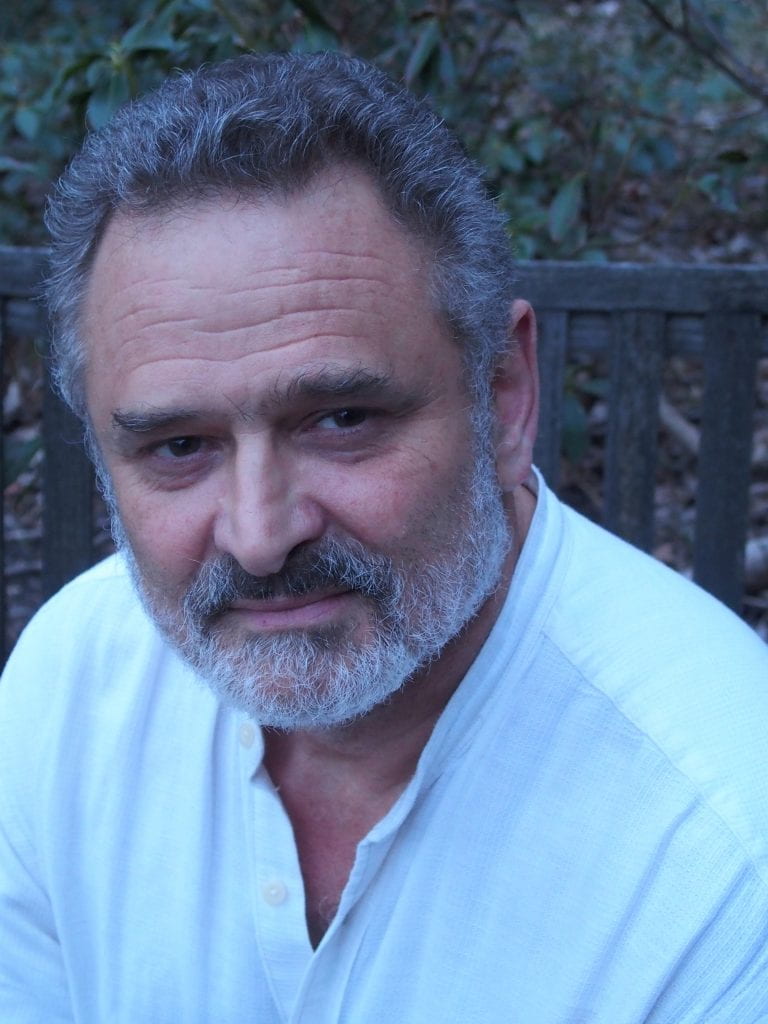 Amherst College Lecturer in English Benigno Sánchez-Eppler teaches two courses on multilingualism: “Language Crossing and Living in Translation” and “The Multilingual Game.”
Amherst College Lecturer in English Benigno Sánchez-Eppler teaches two courses on multilingualism: “Language Crossing and Living in Translation” and “The Multilingual Game.”
The group of students who participated in the Special Topics course “The Multilingual Game” came already deeply engaged with concerns about living with their often relegated home or first language. The combination of “interventions” the group brought to the College community took the issues of multilingualism at Amherst and gave these concerns unprecedented visibility: A public exhibit of the final projects at Keefe; the video “Our Language Stories,” which faculty members watched at the 2017 First Year Seminar Retreat; and “Breaking the Language Barrier,” featured in the College Row section of Amherst Magazine.
In this excerpt Benigno Sánchez-Eppler reflects on his motivations for creating these courses and on how the Amherst College might develop its prowess as a multilingual educational institution.
My urgency to create in 2015 the First Year Seminar “Crossing Languages and Living in Translation” comes from my own language crossings: my own perils and triumphs as a translator and as a culture intermediary, a person straddling more than one otherness. There was a time when nothing in my schooling told me that my home language was a treasure. So, at Amherst I created a course to bring multilingual students to the realization that their home language is a treasure, and that they are not alone in feeling ambivalent, and perhaps even conflicted and depressed by the pressures of assimilation and linguistic suppression. There was a time when my own developing excellence in public, profitable, powerful mainstream English became the standard I would use to devalue and reject that dear home language I had put aside to focus on English acquisition. So, at Amherst, I created a course to make that mechanism of self-devaluation visible, and to invite students experiencing a similar pattern to rehearse and enact their own interruptions of the numbing spiral.
There was a time when my monolingual peers did not have a clue about my excitement and frustration working at the growing edge of a new language so securely theirs, and so much not-yet-my-own. They couldn’t figure out why I could hardly speak, and yet had surprising mastery of the longest and the rarest words in the English latinate register. So, at Amherst, I created a course to help English-speaking monolinguals to discover and own the mongrel amplitude of their English tongue, and its dependence on the layering of difference, on enemies becoming kin, on migration as the basic force for giving peoples their languages.
Speaking to Latinx incoming students and their parents, I hear myself validating what those students will contribute to the content and tone of the courses we teach. After I tell them how their particular cultural interventions will enrich the curriculum, it is easier to speak about how they are not guests of some benevolent hospitality, about how they are Amherst, how they can rearrange the furniture, and host the world in this place that belongs to them.
The College’s plans for “Globalizing the Curriculum” could be implemented with the proposed increase of global and/or international curricular content, with a reinvigorated emphasis on the mastery of foreign languages, and by sending more of our students away in search of immersive experiences abroad. But we must also recognize, name explicitly, and put to use the multicultural and transcultural interiority of our students and faculty members. We have to figure out ways to prioritize attention to the gifts, expertise, case histories, and home languages that our students themselves already carry within them when they get here. When the surrounding culture and curricular priorities don’t validate the treasure of students’ interior cargo, this treasure festers in deferment and disuse. Assimilation is not just a surrender to sameness, but a continual erosion and disabling of what the encircling sameness will not encompass.
The abundant diversity of today’s Amherst students has proved a strong incentive to structure my teaching so I can make more room in the curriculum for the gifts and expertise our students bring, and for maximizing the occasions they have to learn from each other. I remember the classes I took at Williams College back in the late 1970s when the students did or said something bright and the professor would leap for joy and celebrate “the spectacle of the mind unfolding.” I witness a lot of that in the diverse, multi-cultural, mutually self-unveiling Amherst classroom. I remain grateful for the privilege of accompanying these learners as they dwell in a thriving that is true and theirs.
Benigno Sánchez-Eppler
Lecturer in English

